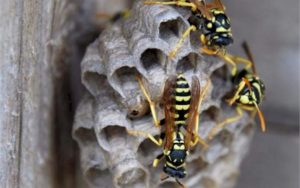Types of Wasps in the DFW Metroplex
There are only a few varieties of wasps in the Dallas-Fort Worth area, but the species that are  here can be some of the most aggressive pests. Wasps in the area are divided into social and solitary groups. Social wasps, which includes the yellowjacket and the bald-faced hornet, are the more aggressive of the pair. If you are concerned about a wasp issue, we have species information down below:
here can be some of the most aggressive pests. Wasps in the area are divided into social and solitary groups. Social wasps, which includes the yellowjacket and the bald-faced hornet, are the more aggressive of the pair. If you are concerned about a wasp issue, we have species information down below:
Social Wasps
Social wasps are usually the more aggressive breeds of wasps. These wasps are aggressive when defending their nests, and the nests can usually become pretty big if not taken care of. Due to the higher aggression, and their ability to inflict multiple stings, be careful if you think you have an infestation.
The first, and most aggressive, one to be aware of is the bald-faced hornet. You can easily identify these by their black bodies and yellow faces. Their nests can get up to a few feet in size and suspended up to 60 feet in the air. Be extremely careful if you believe there are bald-faced hornets around your home. Attacks from them can cause severe allergic reactions that require hospitalization. Because of the aggressive and harmful nature of these hornets, we fully recommend contacting a professional instead of relying on at-home methods.
Finally, The other social wasps you will find in North Texas are the paper wasps and yellowjackets. Paper wasps are the most common and thankfully not as aggressive as the other two, but will still fight to protect their nests. Yellowjackets, on the other hand, are aggressive like bald-faced hornets. We fully recommend calling a professional if you suspect an infestation.
Solitary Wasps
Solitary wasps are usually less aggressive than social wasps. However, these wasps will still attack humans if provoked. The ones you will find in the North Texas area are cricket hunters, cicada killers, and mud daubers. Cicada killers are a nuisance around homes, but rarely sting humans. Mud daubers, once inside, are known to build hives under any overhangs they can. It is important to note that while cricket hunter wasps are uncommon in North Texas, they commonly make their homes through gaps in the foundation. Spotting them in your home could indicate larger foundation issues. They are all black in color.
Prevention Of Wasps Around Your Residence or Business
The best way to keep wasps away is to prevent them before it becomes a problem. Sealing up any small entrances in doors, windows, or walls and removing any outdoor food sources will not only keep wasps, but most other kinds of pests out. Wasps, unlike bees, are known to forage through trash, so keeping bins sealed will help. They tend to avoid aromatic herbs, such as thyme and spearmint. Planting these could help keep them away from outdoor areas
Check any wood structures too. Wasps are known to build nests on wood, and they’ll build wherever has comfortable conditions for them. Think warm, dark, close to the ground, and under wood. Seal up any areas they might be able to build in.
How to Get Rid of Wasps
Be extremely careful if you are going to try to remove wasps on your own. We recommend you wear protective clothing: a bee hat, long-sleeved clothing, protective eyewear, gloves, and a coat and pants that will protect you from stings. Be sure to go at night when the workers and queen are present and less aggressive. Spray a wasp killer directly into the hive for the best effect. If you’re looking at a big nest or the wasps are hornets or yellow jackets, we fully recommend calling a professional.
What We Can Do As Your Local Pest Service Provider
Luckily, we can help anyone remove a wasp nest. At Tactical Pest Services, we offer residential pest control and will be happy to remove wasps from your home. Since they will often rebuild nests and are seasonal during the summer recurring services to ensure they stay out of your home or business for good.
